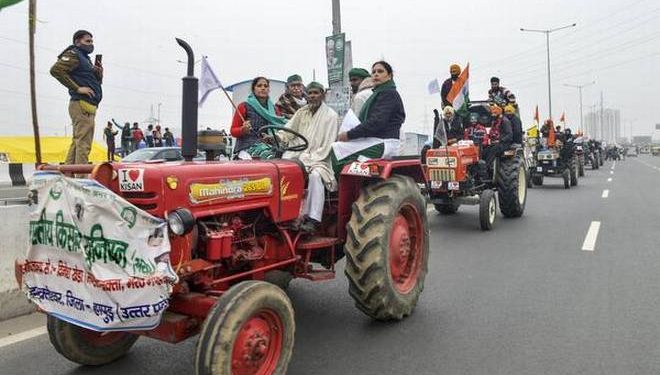The Supreme Court’s ruling on January 18 about the farmers’ proposed tractor rally in Delhi on Republic Day says that it is a matter of law and order and the Delhi police has to take a call. This nips in the bud an attempt by the executive to abdicate its responsibility and make the judiciary do its dirty work. The Apex Court, very smartly, observed during the hearing on a plea seeking an order against the rally that the Centre has all the authority to deal with this matter.
The ruling comes close on the heels of a controversial direction of the SC to form a four-member expert committee to ascertain whether the three contentious farm legislations against which the farmers have been spearheading an agitation at the borders of Delhi for nearly two months are beneficial for farmers or not.
The Apex Court’s direction on constituting the committee was pronounced when the government was trying to buy time and tire out the agitating farmers after nine rounds of talks with them had failed to yield results, with both the sides refusing to budge from their respective stand. While the farmers have been insisting on repealing the three laws in totality, the government continues to parrot its position that it is ready to discuss the laws clause by clause, but would not concede the demand for their annulment.
To escape the yoke, the government has been conveniently diverting critical decisions to the judiciary. This has become the favourite escape hatch for the executive. The farmers easily saw through this game and refused to appear before the committee.
The composition of the committee was a big let-down as all the members are known supporters of the three laws. The court ignored the suggestion of senior lawyer Dushyant Dave appearing for a farmers’ group to include former CJI RM Lodha in the committee to make sure there was balance. CJI SA Bobde did not consider well-known journalist specializing on agriculture and rural development Magsaysay award winner P Sainath as a member, an idea he himself had toyed with earlier. Within hours of the announcement of the names, one of the members, Bhupinder Singh Mann, national president of Bharatiya Kisan Union, recused himself from the committee. As if to strengthen the suspicion that the committee would only put its seal of approval on the government’s position on the laws, Mann said he dissociated himself from the committee because he wanted to be on the side of the farmers.
The Apex Court, as is usual habit, strayed into the role of a mediator instead of adjudicating the legal challenge. The challenge was mainly on two grounds. First, it was contended the Parliament is not competent to enact the laws as the subject comes under the State List. The second plea is that the manner in which they were passed in the Rajya Sabha violated Constitutional provisions. Articles 100 and 107 of the Constitution and the rules of the House stipulate that all matters at any sitting of either House or joint sitting of the Houses shall be determined by a majority of votes of members present. The majority has to be determined only by recording of votes even if one member demands division. The three Bills were passed in the RS by voice vote amidst raucous demand by Opposition members for division. The Deputy Chairman of the House, who was conducting the proceedings, was in such a hurry that he declared them passed without recording the votes. According to Article 107, a Bill shall not be deemed to have been passed unless both Houses agreed to it. What strains credulity further about the honesty of the government exercise is that the President gave his assent to the Bills the same day they were presented to him.
In this backdrop, the SC ruling on tractor parade appears to be a boon to the government. It is a known fact that the Delhi police is administered by the Union Home Ministry. So much so that the Delhi Chief Minister Arvind Kejriwal has often been physically attacked in the presence of Delhi police personnel and has not received any protection from them. Kejriwal’s dissatisfaction with the Delhi police surfaced when he refused use of several sports stadiums of the Delhi government as ‘jails’ or detention grounds for farmers in the initial stages of the protests. The SC ruling is a clear undercover support to the Union government to derail the tractor rally.
It would indeed be a victory for democracy if Delhi police would actually allow the tractor parade to take place and not hide under the pretext of breakdown of law and order or traffic issues to stop it.







































